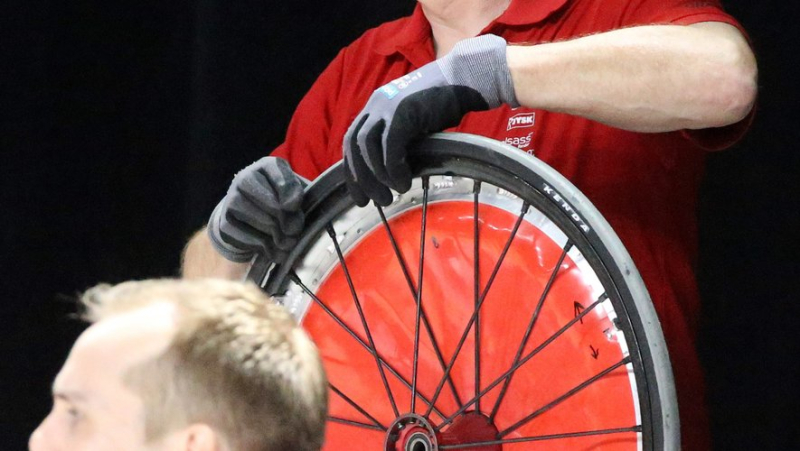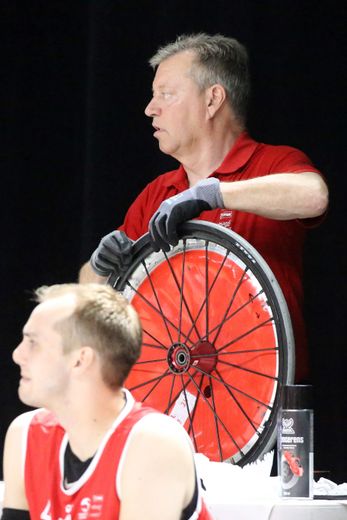Paris 2024 Paralympic Games: prosthetics and wheelchairs, everything can be repaired in the athletes' village


Prothèses et fauteuils roulants, au Village paralympique tout se répare. MAXPPP – NICOLAS GOISQUE
Adjusting a prosthetic leg or changing the damaged wheels of a wheelchair: at the Paralympic Village repair center, technicians have been busy since Wednesday maintaining the daily life and sports equipment of para-athletes.
Kady Dandeneau, Canadian wheelchair basketball player, waits at the entrance to the repair center, located in the heart of the Paralympic Village, north of Paris. She came to have the cushion of her new sports chair adjusted: “It's really convenient to be able to do it here”, she told AFP, before describing to an employee the cut she wanted to make. The latter takes a few marks with a felt-tip pen directly on the part.
Athletes have daily access to the workshop services, provided free of charge by the century-old German company, Ottobock, a partner of the Paralympic Games since 1988.
🏅 Le Village paralympique est prêt à accueillir les athlètes paralympiques et leurs équipes, soit au total quelque 9.000 résidents. Les Jeux se tiendront du 28 août au 8 septembre à Paris #AFPTV ⤵️ pic.twitter.com/kWSs3AH4oG
— Agence France-Presse (@afpfr) August 20, 2024
“We repair equipment of all brands, from walking prostheses for everyday life to wheelchairs for “course” , describes Peter Franzel, the head of the repair center, who expects to carry out more than 2,000 interventions during this edition of the Paralympic Games, organized in Paris from August 28 to September 8.
As soon as the Village opened, requests poured in because “many athletes come to have their equipment checked and also because it is sometimes damaged during transport by plane”.
In three days, three hundred repairs have already been carried out.
Wheels, brakes, cushions
The five workbenches spread around the room are occupied on Saturday afternoon.
Two chairs without their wheels sit on the one at the back. Ronny Heinze adjusts the brakes on the first one and then changes a damaged tire: “These are classic problems, very common”,says the German technician, who has already worked in the repair shop at nine Paralympic Games. Screwdriver in hand, his colleague dismantles the structure of the other chair, owned by a table tennis player, which has cracked under the seat, a less common problem.
In total, 160 Ottobock employees from around forty countries are present to carry out repairs in the Village and on the venues competitions.
🏅 Les para-athlètes du monde entier ont découvert le village paralympique, mercredi 21 août. Au total, 9 000 personnes y logeront.
▶️#JT20H pic.twitter.com/pyzE99kOYy
— Info France 2 (@infofrance2) August 22, 2024
"It's very interesting to work with colleagues who come from different countries", says Hiroki Nakajima, a Japanese technician, as he examines a wheelchair cushion made of multiple black rubber cells, one of which is punctured. After inflating it with a pump, he immerses it in a tank filled with water to identify the origin of the air leak and then seal it.
Problem with the seat, brakes or wheels: the majority of interventions concern armchairs, made up of multiple parts, some of which require regular maintenance.
To be able to respond to all requests, the workshop has spare parts, 1,500 references are stored in its storage space, opposite the workshop.
A small aisle is dedicated to the components of leg prostheses. Various mechanical feet and knees line up on the blue metal shelves. Another aisle brings together boxes in which are piled wheels and inner tubes of all sizes, for the different models of wheelchairs.
Peace of mind
Quentin Queva works on a leg orthosis, split under the foot by wear. Installed at the entrance to the workshop, facing a computer screen, he scans the part in order to be able to mold a new, identical one. Using technology allows us to “save time and improve precision”, says this French orthotist, who is present for the first time at the Paralympic Games repair workshop. Working for athletes “is a bit of extra pressure but it's a privilege”, he confides with a smile.
Several para-athletes also came today to have their leg prostheses used on a daily basis adjusted. “It's important to have the best possible setting to spend less energy on the move and have more during the event”, explains French athlete Alexis Sanchez as he leaves one of the two fitting rooms located in front of the workshop.
For this para-rower, the presence of this workshop is “very reassuring”: “We know that if we have the slightest problem, we can get the equipment repaired, which allows us to concentrate on 100% on the competition”.




